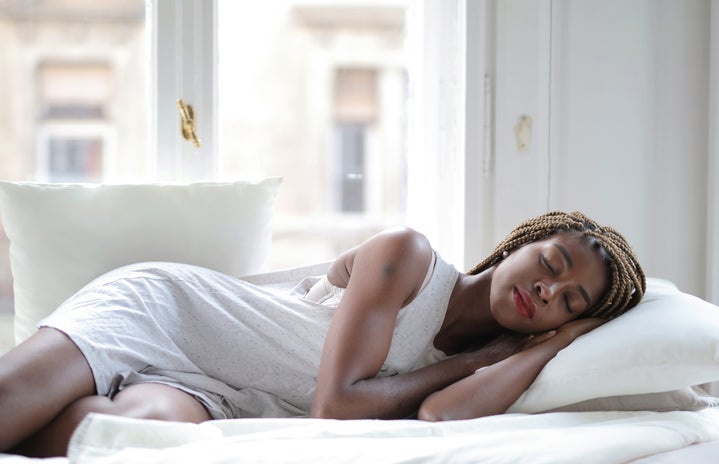“I’m so tired.”
We hear it all the time from our friends, family, roommates, and classmates. Sleep deprivation is almost romanticized on college campuses. Students compete to see who can get the least amount of sleep possible, like fatigue is something you should strive to achieve. But this couldn’t be further from the truth.
Neglecting your circadian rhythm, our internal body clock, has serious consequences that should not be ignored. When this cycle is out of sync, you can develop insomnia, gain weight, and even worsen your mental health. On the other hand, when we keep our body cycles healthy, we stay healthy, too.
Maybe you’re like me and completely lost track of my sleep schedule over spring break, or maybe you just want to maintain the healthy routine you have now. Whatever the case, here are a few tips to help you stay on track.
Create a sleep schedule
If you want to reset your internal clock, your first step should be establishing a sleep schedule – and sticking to it. For college students, experts recommend getting seven to nine hours of shuteye per day. For example, if your earliest class is at 8 a.m., you’ll probably want to get up at least one hour before to get ready and eat breakfast. So, count backwards eight hours from 7 a.m., and your target bedtime is around 11 p.m. the night before. This schedule might be brutal at first, but eventually you’ll find yourself naturally getting sleepy at 11 p.m. and waking up at 7 a.m. In any case, you should generally aim to go to bed earlier and wake up in the early morning hours to adapt your sleep schedule to the sun. The reason for this is that our circadian cycles are designed to coordinate with sunlight. As the sun rises, so does you energy. As the sun goes down, you energy follows it. Aligning your schedule to these natural changes can help you get the most out of your day. This is why I intentionally schedule my classes to be between 9:30 a.m. and 2pm, when I am most alert, because I know my focus will be weaker as the day goes on.
Avoid caffeine and limit nightly screen use
Another surefire way to keep your body clock in sync is by reducing your caffeine intake or avoiding it altogether. (I know what you’re thinking, but hear me out.) We all have that friend who drinks iced coffee from Dunkin’ every morning religiously, or always studies with a Red Bull in hand. If you can’t think of anyone, you probably are that person. While a cup of coffee might sound like a good idea in the moment, you might find yourself unable to “shut off” your brain by bedtime. This is because caffeine has a half-life of five hours in adults, meaning it takes around five hours for your body to eliminate half the amount of caffeine you consumed. So, if you’re a coffee lover at heart, try to toss the cup by 3 p.m. or dinnertime at the latest. By delaying your body clock with caffeine, you limit your ability to perform at your best both in class and outside of class. Using your cell phone or laptop at night can also keep you up because these devices emit blue light, which delays the production of melatonin at night. So, put away your devices at least one hour before bedtime. If you really need to study, switch your laptop to nighttime mode or invest in blue light glasses, but try not to make it a habit.
Exercise regularly
Getting regular exercise can also help reset your circadian rhythm. Moderate-to-vigorous exercise can cut down the amount of time it takes to fall asleep, helping you reach your target bedtime. However, timing is everything. Intensive exercise within three hours of bedtime can be overstimulating due to increased heart rate, body temperature, and adrenaline levels, making it harder to fall asleep. Your best bet is to exercise in the morning or early afternoon, which will help you feel more awake for the day ahead. If your target bedtime is at 11 p.m., subtract three hours and that brings you to 8 p.m., meaning you should get at least 30 minutes of exercise before then, but preferably earlier in the day. This can be as simple as hitting the gym after class or, if you live on Lower Campus at Bentley, ditching the shuttle and choosing to walk to class. As the weather gets nicer, you might even play Frisbee with your friends on the green space. Whatever your style is, exercise has countless benefits, including reduced anxiety, lower blood pressure, and improved brain and heart health.
We all know that sleep is important, but your circadian rhythm is more critical to your health than you might think. So do yourself – and your GPA – a favor and turn back your alarm clock an hour or two to ensure you are aligning it with your internal clock. Better sleep means you won’t need to rely on your caffeine-filled iced coffee to get you through the day. Your wallet will thank you, and so will your future self by the time your head hits the pillow. Similarly, try to call it a day by 9 p.m. or earlier. This means shutting electronics off for the night so your body can produce the melatonin it needs. Finally, try getting some exercise in the morning or early afternoon, even if just for a half-hour. Think about it this way: The median episode length for Netflix shows is 55 minutes. Surely you can make time for 30 minutes of exercise if you have time to watch an hour of your favorite show.
I think it’s time we stopped romanticizing sleep deprivation in college. Instead of competing to see who’s the most sleep-deprived, we should be challenging each other to get the best sleep we can.


